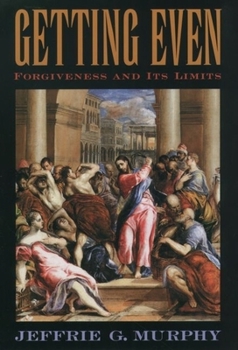Getting Even: Forgiveness and Its Limits
Select Format
Select Condition 
Book Overview
We have all been victims of wrongdoing. Forgiving that wrongdoing is one of the staples of current pop psychology dogma; it is seen as a universal prescription for moral and mental health in the self-help and recovery section of bookstores. At the same time, personal vindictiveness as a rule is seen as irrational and immoral. In many ways, our thinking on these issues is deeply inconsistent; we value forgiveness yet at the same time now use victim-impact...
Format:Hardcover
Language:English
ISBN:0195151496
ISBN13:9780195151497
Release Date:March 2003
Publisher:Oxford University Press, USA
Length:152 Pages
Weight:0.65 lbs.
Dimensions:0.8" x 8.3" x 5.7"
Customer Reviews
2 ratings
Clarity and insight on forgiving
Published by Thriftbooks.com User , 16 years ago
Augustine once wrote that he knew exactly what the word "time" meant until asked to define it. Then, he confessed, he was flummoxed. I suspect that something similar can be said about the word "forgive." Many of us like to think we understand the word, and we generally just assume that the act it designates is unproblematically virtuous. But many of us would have a good deal of trouble trying to express what we mean when we use the word. And if we think deeply about what it means to forgive, we might balk at viewing the act as always good. Jeffrie Murphy has thought long and hard about what it means to forgive, and his elegant little book is well worth reading. He argues that forgiveness is an inner change of heart that overcomes vindictive passions--such as revenge; that forgiving isn't the same as mercy, pardon, or reconciliation; that healing can be a healing virtue when it checks anger and cruelty and restores relationships; but that forgiveness may not always be virtuous, especially if it dmages self-respect, dignity, and loyalty to the moral order. Some vindictive passions, in other words, may not be self-destructive, pointless, or unfitting to the circumstances. They may be entirely rational, entirely appropriate--and, in fact, ethically obligatory. Along the way, Murphy has some interesting reflections on (self-)forgiveness and therapy, forgiveness and the law, and forgiveness and Christianity. He writes beautifully, is witty and gently self-deprecating at times, and appeals to a wide array of literature to illustrate his arguments. And speaking of his arguments: they're concise, pointed, and insightful, representative of the very best of the Anglo-analytic philosophical tradition to which Murphy belongs. All in all, a very good book indeed. For readers interested in Continental approaches to forgiveness, Jacques Derrida's On Cosmpolitanism and Forgiveness and Vladimir Jankelevitch's Forgiveness are good starting points. For readers interested in group forgiveness, as opposed to the interpersonal forgiveness that's Murphy's primary concern, I'd recommend Martha Minow's Between Vengeance and Forgiveness.
Excellent academic and philosophic view of violence
Published by Thriftbooks.com User , 19 years ago
This book was required reading for me for a Master's course on violence. Being a person trained in the physical sciences, I must say I had a difficult time reading this book. I like equations and concepts that are right or wrong or a question I can calculate an answer that is either correct or incorrect. This book is a highly academic and philosophic view of violence, forgiveness, repentance, and vengeance. In the authors own words (or at least paraphrased), the book sets out to show that it is possible vindictiveness and vengeance possess some positive value, the relationship between repentance and legitimate forgiveness, explore self-forgiveness, how these issues play out in criminal law and psychotherapy, and the role of Christianity in the previously mentioned topics. Personally, I found parts of the book to drag on (Remember, I studied Engineering. Philosophy is a new concept to me), but overall I found the book to be unique and intriguing. The author conveys the point that forgiveness is great, but the victim has every right to be vindictive. The vindictive side of the victim is just as legitimate as feelings of forgiveness. I was also very intrigued at the author examination of the topic of Christianity and forgiveness. In a nutshell, for every story of forgiveness Christianity preaches, there is a story of raw rage and vengeance. The book is a well thought out view of violence, forgiveness, and vengeance. The author does not pretend to have all the answers, just offer his personal view. I believe that anyone who is trained in the physical sciences will have a difficult time reading this book (at least I did). I would recommend this book as an advanced reference on the topic of forgiveness and vengeance. I would also recommend the book to someone who enjoys reading philosophic views of today's issues in society.





